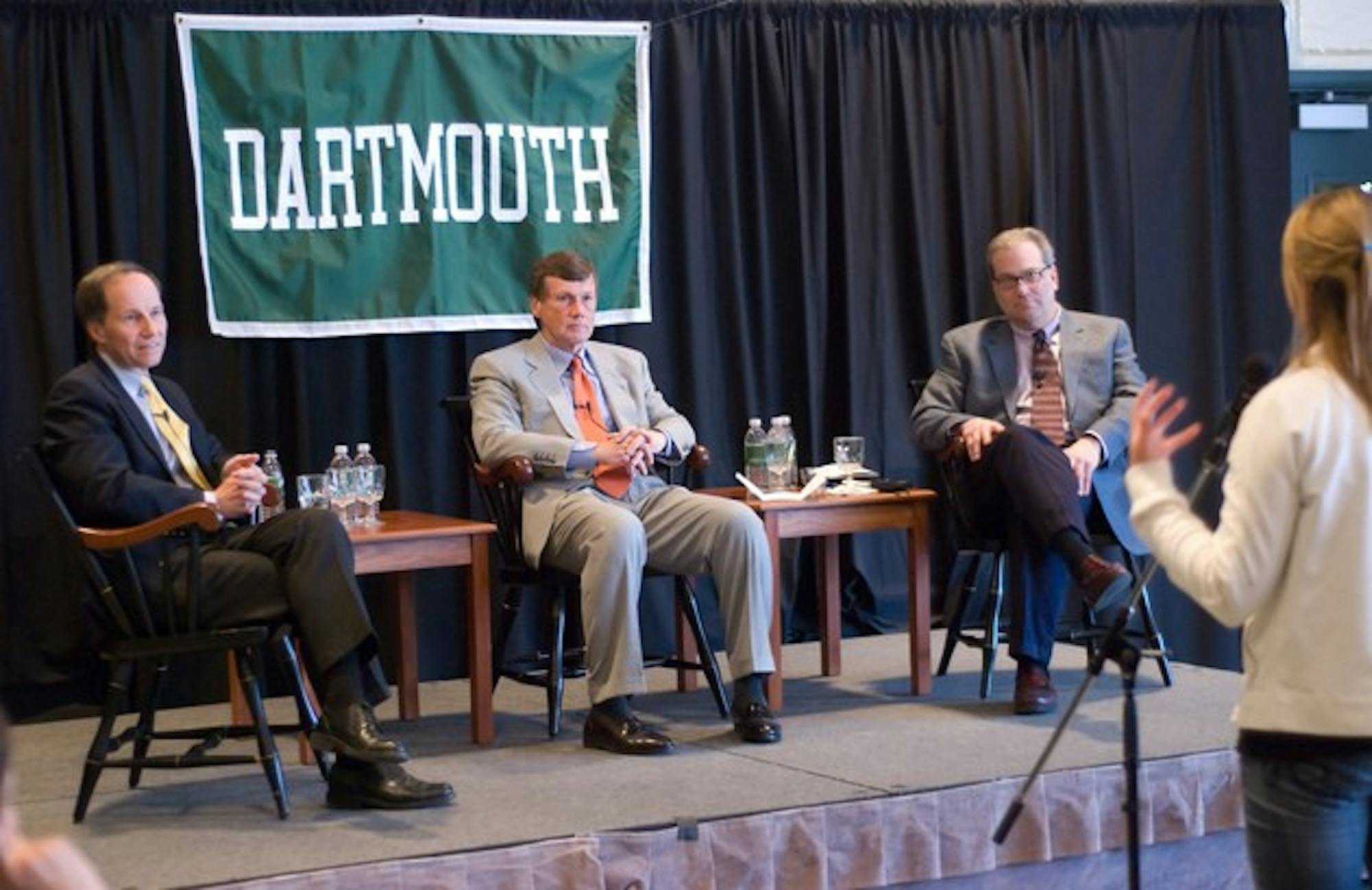Several students suggested that undergraduates participate directly in the search process. Responding to Student Assembly President-elect Molly Bode '09, who asked if the search committee would include students, Haldeman said he could not answer this and similar questions because the Board has not yet finalized the selection process.
Each of Dartmouth's past two presidential search committees had one student member, Haldeman said, and the Board will take into account previous presidential searches at the College and "best practices" from other institutions.
The Board must also balance transparency with confidentiality throughout the process, Haldeman and Mulley said at the student session, because making potential candidates' names public could jeopardize the candidates' careers or current positions at other institutions.
"We're probably not going to pick somebody who's been out of work for 18 months," Haldeman said. "Each of the candidates is going to know that, 'Yeah, this would be great if I became the president of Dartmouth, but if I am the number two or three or five [choice], I'd like to stay where I am now.'"
Many students stressed the benefits of choosing a new president who is already familiar with the College. The Board will consider "as broad a universe of people as possible," Haldeman said, adding that both external and internal candidates bring their own sets of advantages and disadvantages.
"You can be sure that we will be seeking a president who understands the uniqueness of Dartmouth's past, its visions and the uniqueness of its cohesiveness," Mulley said.
A candidate's gender, prior affiliation with the College, or any other specific facet of his or her identity will not singly determine the Board's decision, the trustees said.
"In general, searches like this don't hinge on a single criterion like that," Mulley told the students. "It's usually a much richer constellation of attributes, of qualities, of characteristics that are attached to real people."
Any new president must also balance modernization with tradition, Haldeman said in response to a question from Assembly Vice President-elect Nafeesa Remtilla '09 about Dartmouth's social life, gender relations at the College and the Greek system.
"This notion of respecting Dartmouth's history, tradition -- no change versus evolution and getting better -- is one of those tough issues, one of those tough trade-offs," Haldeman said.
Several students said the College's next president should focus on making the College more sustainable and environmentally friendly, a concern that Mulley said was also expressed in many of the e-mails received by the Board. Staff members at Dartmouth shared this view.
"Climate change is the largest challenge our species, world and College have ever faced," Margaret Fanning, a research engineer at Thayer School of Engineering, said. "I think it's very important the president is willing to address that both for College sustainability and educating students."
Both students and staff members emphasized College's next president having a broad focus that extends beyond Hanover.
Increasing the diversity and integration of Dartmouth's student body was also a prominent topic at both sessions.
"It's great that there is this diversity, but you know, one of the things is that there's not enough resources once they get here," one staff member said. "Can an African-American kid get a haircut in Hanover? It may not sound like a big deal, but the more I think about it, it is."
Staff members were also concerned that the College does not always acknowledge the Dartmouth staff for their efforts.
"Our faculty, students and alumni are often talked about with great reverence," Nelson Armstrong '71, special assistant to the president, said. "As I looked around this room, I'm stunned the crowd is so small. We don't give enough recognition to the staff."
In addition to holding open forums for students and staff, Haldeman and Mulley held similar forums for faculty and members of the Dartmouth Club of the Upper Valley. The Dartmouth community can also offer input online. The Board has received more than 200 e-mails since April 4, when the search committee's web site was first activated, Mulley said. The content of the e-mails has reflected the opinions expressed in the forums, Haldeman said, although a greater number of e-mails focused on the president's background, with many "strongly worded" e-mails asserting that the new president must be recruited from academia rather than from business. Students, staff, faculty and almuni all expressed similar concerns in these e-mails, Haldeman said.
The Board will continue to solicit input from the wider Dartmouth community, Haldeman said, although he did not know in what format because the search committee will not be formed until June and the search is still in its preliminary stages.
Staff writer Michael Coburn contributed to the reporting of this article.




